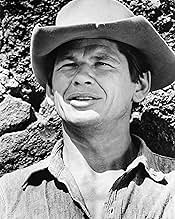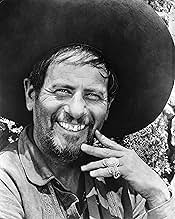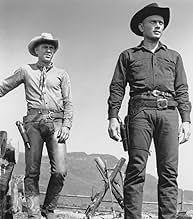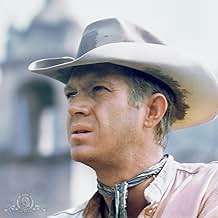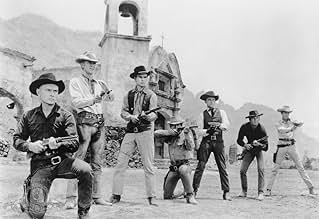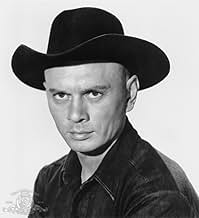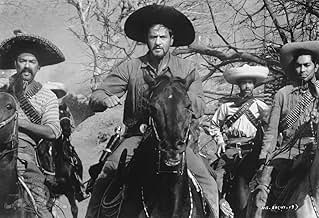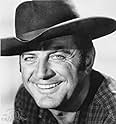Seven gunfighters are hired by Mexican peasants to liberate their village from oppressive bandits.Seven gunfighters are hired by Mexican peasants to liberate their village from oppressive bandits.Seven gunfighters are hired by Mexican peasants to liberate their village from oppressive bandits.
- Nominated for 1 Oscar
- 2 wins & 6 nominations total
Jorge Martínez de Hoyos
- Hilario
- (as Jorge Martinez de Hoyas)
Natividad Vacío
- Villager
- (as Natividad Vacio)
John A. Alonzo
- Miguel
- (as John Alonso)
Summary
Reviewers say 'The Magnificent Seven' is often compared to 'Seven Samurai', highlighting similarities in plot and themes. While praised for its strong cast, including Yul Brynner and Steve McQueen, and its iconic score, it is seen as less profound and more formulaic. The Western setting and Hollywood production style differentiate it from the more culturally specific and artistically driven original.
Featured reviews
This is considered one of the all-time great westerns: a real classic, and I can't argue. I've seen a number of faster-moving and better westerns but few with a cast this good that's still entertaining. I never get tired of seeing the stars in this movie. How often are actors like Yul Brynner, Steve McQueen, Charles Bronson, James Coburn and Eli Wallach boring.....or all in the same movie? Not too often. Throw in Robert Vaughn and Horst Buchholz and you have a memorable cast.
As "cool" as McQueen was in his day, in this film Brynner was the "coolest" guy. Just the intense look on his face with those piercing eyes and deep voice command attention whenever he's on screen. Meanwhile, nobody but nobody played a Mexican villain better than Wallach.
The "good guys" in this classic movie are all professional killers and show their human side by admitting their weaknesses and the emptiness of their profession. No one says it better here than Bronson, who gives a couple of very powerful "sermons" to some young boys.
A solid western and a pretty famous theme song, too! It's also another good example of showing some real tough guys who can be convincing without profanity. Can you imagine the dialog if this film was re-made today?!
As "cool" as McQueen was in his day, in this film Brynner was the "coolest" guy. Just the intense look on his face with those piercing eyes and deep voice command attention whenever he's on screen. Meanwhile, nobody but nobody played a Mexican villain better than Wallach.
The "good guys" in this classic movie are all professional killers and show their human side by admitting their weaknesses and the emptiness of their profession. No one says it better here than Bronson, who gives a couple of very powerful "sermons" to some young boys.
A solid western and a pretty famous theme song, too! It's also another good example of showing some real tough guys who can be convincing without profanity. Can you imagine the dialog if this film was re-made today?!
Based somewhat faithfully on the Akira Kurosawa classic Shichinin no samurai, The Magnificent Seven could be mistaken for just another of the many Westerns that were turned out in Hollywood during this era. But there is a certain something that keeps The Magnificent Seven unique. Part of it is the concept borrowed from the earlier Japanese film, but some of it lies in the attitude of the seven mercenaries referred to in the title.
Much is made here of the difference between fighting for money, fighting for justice, or fighting for a future. While this version of Kurosawa's epic contains all the philosophical leanings of the original, it isn't nearly as long-winded or languid. The downside to this is that it isn't nearly as moody or powerful. In fact, one can easily see the difference between American and foreign cinema simply by comparing Shichinin no samurai with The Magnificent Seven. One is incredibly dark and downbeat most of the time. The other mostly has a score that is so major it wouldn't sound out of place in Seven Brides For Seven Brothers.
Differences in feeling aside, the ultimate question is whether this version of the story manages to entertain. The hardest challenge any film faces is keeping the audience amused while all the exposition is laid out. Here, the exposition is kept to a minimum while carefully inserted between some fast-paced, albeit very mild action sequences.
Sometimes, the dialogue ("We deal in lead, friend.") gets incredibly stilted. Sometimes, it seems incredibly wise. Well, since we have examples of films where it's all stilted, all the time, we can forgive this one. The film also includes several textbook examples of how to include a sudden plot element without seeming contrived. When we learn why Calvera's men just won't go away, it needs no setup simply because it is consistent with their behaviour throughout the rest of the film.
In the end, The Magnificent Seven comes off as an excellent remake of a masterpiece. There are better Westerns out there, and there are better action films, but there aren't many. I gave it a nine out of ten. Go in expecting to be entertained, but little more, and you cannot go wrong.
Much is made here of the difference between fighting for money, fighting for justice, or fighting for a future. While this version of Kurosawa's epic contains all the philosophical leanings of the original, it isn't nearly as long-winded or languid. The downside to this is that it isn't nearly as moody or powerful. In fact, one can easily see the difference between American and foreign cinema simply by comparing Shichinin no samurai with The Magnificent Seven. One is incredibly dark and downbeat most of the time. The other mostly has a score that is so major it wouldn't sound out of place in Seven Brides For Seven Brothers.
Differences in feeling aside, the ultimate question is whether this version of the story manages to entertain. The hardest challenge any film faces is keeping the audience amused while all the exposition is laid out. Here, the exposition is kept to a minimum while carefully inserted between some fast-paced, albeit very mild action sequences.
Sometimes, the dialogue ("We deal in lead, friend.") gets incredibly stilted. Sometimes, it seems incredibly wise. Well, since we have examples of films where it's all stilted, all the time, we can forgive this one. The film also includes several textbook examples of how to include a sudden plot element without seeming contrived. When we learn why Calvera's men just won't go away, it needs no setup simply because it is consistent with their behaviour throughout the rest of the film.
In the end, The Magnificent Seven comes off as an excellent remake of a masterpiece. There are better Westerns out there, and there are better action films, but there aren't many. I gave it a nine out of ten. Go in expecting to be entertained, but little more, and you cannot go wrong.
A wonderful classic beautifully scored and shot.
There are so many moody looks between characters, and little movements or idiosyncrasies that just make each of the gunmen seem so real. Apparently, there were big egos behind the camera that caused these acts of showmanship, but unlike most films where the egos clash, here they just build the characters up without harming them.
Yul Brynner and Steve McQueen are just wonderful, and James Coburn and Charles Bronson both put in equal performances. There's just nothing about this film that you can fault, the script is kept light when required and the stunning score lifts up and the acting is huge but never too much. This is a must see again and again.
There are so many moody looks between characters, and little movements or idiosyncrasies that just make each of the gunmen seem so real. Apparently, there were big egos behind the camera that caused these acts of showmanship, but unlike most films where the egos clash, here they just build the characters up without harming them.
Yul Brynner and Steve McQueen are just wonderful, and James Coburn and Charles Bronson both put in equal performances. There's just nothing about this film that you can fault, the script is kept light when required and the stunning score lifts up and the acting is huge but never too much. This is a must see again and again.
I recently subjected "The Magnificent Seven" to just about the toughest test imaginable--I watched it just a few days after "Seven Samurai." And while I'm not going to pretend it's on par with Kurosawa's astounding masterpiece, I have to tip my hat to Hollywood on this one: it's good, DAMN good, among the best American Westerns.
The focus of the screenplay is more on post-Bogart-pre-Eastwood cool banter than the gradual, taciturn character development of "Seven Samurai," but that doesn't mean that the film doesn't have a heart. Considering it clocks in at barely over two hours (compared to the marathonic three and a half of "Samurai"), it actually does a fantastic and very economical job of fleshing out its memorable cast of characters.
One particularly wonderful scene that stuck in my memory from the first time I saw the film ten years ago is the one where Lee (Robert Vaughn), drunk in the middle of the night, confesses his frailties and fear to two of the farmers. The scene (along with the general story of these down-and-out heroes) was groundbreaking in that it began the deconstruction and deromanticization of the Western hero which would be brought to fruition in Sergio Leone's unparalleled spaghetti Westerns.
The star-studded cast wouldn't hold up doing Shakespeare, but they're ideal in this gunslinging, cool-talking tough-guy adventure. As if a lineup of heroes that included Yul Brynner, Steve McQueen, Charles Bronson, and James Coburn wasn't enough, Eli Wallach steals the show as the Mexican bandit chief, a worthy precursor to his classic role "The Good, the Bad, and the Ugly." If the screenplay has a major flaw, it's that his character isn't featured more.
The score is, of course, one of the all-time classics. And while not as alive visually as the Japanese film that inspired it or the Italian Westerns it influenced, it's still mighty fine to look at, and the gunfights don't disappoint.
The pieces add up to one of the great entertaining films of all time, which still manages to be moving and morally aware despite its Hollywoodization of Kurosawa's vision.
The focus of the screenplay is more on post-Bogart-pre-Eastwood cool banter than the gradual, taciturn character development of "Seven Samurai," but that doesn't mean that the film doesn't have a heart. Considering it clocks in at barely over two hours (compared to the marathonic three and a half of "Samurai"), it actually does a fantastic and very economical job of fleshing out its memorable cast of characters.
One particularly wonderful scene that stuck in my memory from the first time I saw the film ten years ago is the one where Lee (Robert Vaughn), drunk in the middle of the night, confesses his frailties and fear to two of the farmers. The scene (along with the general story of these down-and-out heroes) was groundbreaking in that it began the deconstruction and deromanticization of the Western hero which would be brought to fruition in Sergio Leone's unparalleled spaghetti Westerns.
The star-studded cast wouldn't hold up doing Shakespeare, but they're ideal in this gunslinging, cool-talking tough-guy adventure. As if a lineup of heroes that included Yul Brynner, Steve McQueen, Charles Bronson, and James Coburn wasn't enough, Eli Wallach steals the show as the Mexican bandit chief, a worthy precursor to his classic role "The Good, the Bad, and the Ugly." If the screenplay has a major flaw, it's that his character isn't featured more.
The score is, of course, one of the all-time classics. And while not as alive visually as the Japanese film that inspired it or the Italian Westerns it influenced, it's still mighty fine to look at, and the gunfights don't disappoint.
The pieces add up to one of the great entertaining films of all time, which still manages to be moving and morally aware despite its Hollywoodization of Kurosawa's vision.
Every year a Mexican bandit and his large gang of forty thieves harass and plunder a poor farming village south of the American border. They take what they need in provisions from the increasingly impoverished inhabitants. Deciding that enough means ENOUGH (and the wise old man in the village advises that it is DO or DIE), the village elders recruit gunmen from the US to defend them. The actual recruiting of six of the motley crew of gunslingers is done by top American gunman, the grim Chris Adams (Yul Brynner), dressed in black. The wages are only twenty dollars but chow is included, and it is good Mexican food (as the Americans discover). Each one of the defenders has his own reasons for volunteering, and not necessarily as a sense of doing the right thing (one of the men is a soldier of fortune). The men have various talents. For instance, one is a sharpshooter; another is handy with a knife. Much of the film is obviously a build-up to the final confrontation between the "good guys" and the banditos.
Outside of the rousing action-packed sequences, this movie has four merits: the actors, the cinematography, Elmer Bernstein's Oscar-nominated music score, and the on-location filming in Mexico. Stars and future stars like Yul Brynner, Charles Bronson, Steve Mc Queen, Robert Vaughn, and James Coburn do not disappoint. Eli Wallach, the future "Tuco," stars as an appropriate pitiless Mexican leader Calvera, who is not without his own concerns. Of course, with so many personalities, actors "battle" for screen time. There is an underlying message in this movie (and in subsequent remakes) that is overlooked: Mexico was a place of anarchy where the federal government could not always keep law and order.
John Sturges' western was lifted from Akira Kurosawa's "Seven Samurai" (1954), perhaps the greatest movie ever filmed in Japan. In this original version, seven unemployed samurai swordsmen are also hired to fight bandits who terrorize a village. But Kurosawa made a superior film showing the importance of the code of honor of the defenders along with their three-dimensional character development (the film's length was much longer). He even showed a sketch of the Japanese village and the name (or symbols) of each of the bad guys. So when one of them was bumped off, one of the samurai would cross off his name from the bandit list. This helps the audience understand the defensive strategy and what was happening in the battles as the number of the bandits diminished.
Nevertheless, "The Magnificent Seven" does stand on its own merits in the heyday of American westerns as a very good movie to enjoy. Even though the pacing is slow, it remains worthwhile watching.
Outside of the rousing action-packed sequences, this movie has four merits: the actors, the cinematography, Elmer Bernstein's Oscar-nominated music score, and the on-location filming in Mexico. Stars and future stars like Yul Brynner, Charles Bronson, Steve Mc Queen, Robert Vaughn, and James Coburn do not disappoint. Eli Wallach, the future "Tuco," stars as an appropriate pitiless Mexican leader Calvera, who is not without his own concerns. Of course, with so many personalities, actors "battle" for screen time. There is an underlying message in this movie (and in subsequent remakes) that is overlooked: Mexico was a place of anarchy where the federal government could not always keep law and order.
John Sturges' western was lifted from Akira Kurosawa's "Seven Samurai" (1954), perhaps the greatest movie ever filmed in Japan. In this original version, seven unemployed samurai swordsmen are also hired to fight bandits who terrorize a village. But Kurosawa made a superior film showing the importance of the code of honor of the defenders along with their three-dimensional character development (the film's length was much longer). He even showed a sketch of the Japanese village and the name (or symbols) of each of the bad guys. So when one of them was bumped off, one of the samurai would cross off his name from the bandit list. This helps the audience understand the defensive strategy and what was happening in the battles as the number of the bandits diminished.
Nevertheless, "The Magnificent Seven" does stand on its own merits in the heyday of American westerns as a very good movie to enjoy. Even though the pacing is slow, it remains worthwhile watching.
Did you know
- TriviaAlthough the film received mixed reviews, Akira Kurosawa was so impressed he sent John Sturges a ceremonial sword as a gift.
- GoofsSteve McQueen wears Levi's jeans with the famous red tab, which were not introduced until the 1930s.
- Quotes
[Calvera has just captured the Seven]
Calvera: What I don't understand is why a man like you took the job in the first place, hmm? Why, huh?
Chris: I wonder myself.
Calvera: No, come on, come on, tell me why.
Vin: It's like a fellow I once knew in El Paso. One day, he just took all his clothes off and jumped in a mess of cactus. I asked him that same question, "Why?"
Calvera: And?
Vin: He said, "It seemed to be a good idea at the time."
- Crazy creditsAnd Introducing Horst Buchholz
- Alternate versionsThe German theatrical release differs from the German VHS video in the scene where the magnificent seven have been taken by surprise and have to put down their weapons on the table. Chico is the last one and stands in enragement. In the theatrical version he then nevertheless unstraps his belt like the others. In the VHS video version Chris jumps at Chico just in that moment when he wants to pull the gun. Chris takes his gun and puts it on desk. Then Chico unstraps his belt.
- ConnectionsFeatured in Precious Images (1986)
- SoundtracksThe Magnificent Seven Theme
Written by Elmer Bernstein
Everything New on Prime Video in June
Everything New on Prime Video in June
Your guide to all the new movies and shows streaming on Prime Video in the US this month.
- How long is The Magnificent Seven?Powered by Alexa
Details
- Release date
- Country of origin
- Languages
- Also known as
- Les sept mercenaires
- Filming locations
- Cuernavaca, Morelos, Mexico(desert, sets)
- Production companies
- See more company credits at IMDbPro
Box office
- Budget
- $2,000,000 (estimated)
- Gross worldwide
- $416
- Runtime2 hours 8 minutes
- Color
- Sound mix
- Aspect ratio
- 2.35 : 1
Contribute to this page
Suggest an edit or add missing content



